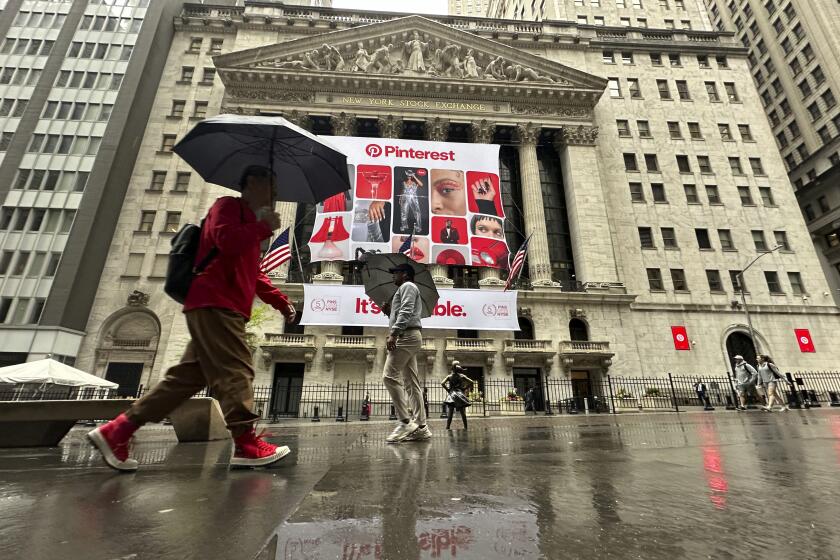STOCKS : Dow Off 14.32; Market Slips 3rd Day in Row
Stock prices gave ground in a sluggish session Thursday, posting their third straight loss since the market reached a record high at the start of the week.
The Dow Jones index of 30 industrials dropped 14.32 to 2,897.33, extending its decline over the last three sessions to 37.86 points.
In the broader market, declining issues outnumbered advances by about 4 to 3 in nationwide trading of New York Stock Exchange-listed stocks, with 638 up, 852 down and 528 unchanged.
Big Board volume came to 160.42 million shares, against 164.02 million in the previous session.
Retailing and gold mining stocks were among the weaker issues. But selling was generally restrained, a sign that the rally could resume soon, analysts said.
“It’s a normal correction,” said Thomas Gallagher, head of block trading at Oppenheimer & Co.
Stocks rose modestly at the start of the session, but the rally ran into a wall of profit taking by late morning.
Losses were trimmed, however, in the last hour on news that U.S. consumer credit in April rose by a smaller-than-expected $584 million, compared to a revised $2.4-billion increase for March.
Stock traders also appeared to draw cautious conclusions from activity in the bond market, where prices were little changed to slightly higher.
Over the past several weeks, government bonds have recovered about half the ground they lost as interest rates rose earlier in the year. That has evidently prompted money managers at investing institutions to pump some of their large cash reserves into stocks.
But over the past couple of days, uncertainty has evidently increased over whether rates can keep going down.
Precious-metals stocks were broadly lower, extending their recent slide as the price of gold remained under pressure. ASA Ltd. fell 1 7/8 to 44 5/8, American Barrick Resources dipped 7/8 to 16 1/2, Homestake Mining dropped 1 to 16 3/4, Battle Mountain Gold lost 3/4 to 11 1/2 and Newmont Gold slipped 1 5/8 to 39 3/4.
USX dropped 3/8 to 33 5/8. The company said a vote count showed that shareholders rejected a proposal from Carl C. Icahn, a major investor in the company, that it spin off at least 80% of its steel operations.
Carter Hawley Hale jumped 7/8 to 6 3/8, apparently on optimism about recent sales trends.
Some financial stocks continued to advance, including HomeFed, up 1 to 32 3/4; Downey Savings, up 1/8 to 18 3/4, and GlenFed, up 1/8 to 15 1/4. First Interstate, however, lost 1 1/2 to 42 7/8.
In foreign trading, Tokyo stocks closed firmer as investors shopped for bargains. The key 225-share Nikkei index closed up 239.00 points at 33,192.50.
Share prices also ended higher on the London Stock Exchange. The Financial Times 100-share index rose 19.9 points to end the day at 2,378.4.
In Frankfurt, West Germany, stocks drifted downward. The 30-share DAX index fell 11.59 points to end at 1,837.43.
CREDIT Bond Prices Drift Generally Higher On a day lacking significant economic news, bond prices were mostly higher in light trading.
The Treasury’s benchmark 30-year bond gained 1/8 point, or $1.25 per $1,000 in face amount. Its yield, which falls when prices rise, slipped to 8.42% from 8.44% late Wednesday.
Economists said the resignation of Manuel H. Johnson, vice chairman of the Federal Reserve Board, had little effect on trading because Johnson was not considered to be a critical swing vote in setting monetary policy.
Bond prices started the day lower but inched up in the afternoon on news that consumer credit expanded far less than expected in April. The suggestion was that consumer spending had tailed off as the economy slowed because of the Fed’s tight-credit policy, designed to stem inflation.
The federal funds rate, the interest rate banks charge each other on overnight loans, was quoted at 8.25%, up from 8.188% late Wednesday.
CURRENCY West German Trade Data Spurs Dollar The dollar rose slightly against the West German mark and other currencies but slipped against the Japanese yen.
The dollar bought 1.6940 marks in New York late Thursday, up from 1.6880 Wednesday. But it fell to 152.55 Japanese yen from Wednesday’s 152.65.
“This is a confusing time,” said Robert Klein, treasurer of CIC-Union Europeenne International in New York. “There’s a positive psychology for the dollar and the bond market. But for every reason to buy the dollar, there’s one to sell it.”
The dollar gained on a West German trade report that signaled the mark may weaken and also on continued ethnic unrest in the Soviet Union, said John Hazelton, vice president at Manufacturers Hanover.
Despite the positives for the dollar, traders said the recent slowdown in the U.S. economy will prevent the currency from rising much further.
The British pound bought $1.6895 in New York, up slightly from $1.6880 on Wednesday.
The dollar jumped to 1.4450 Swiss francs from 1.4350 Wednesday and to 1.1705 Canadian dollars from 1.1700.
Against the French franc, the dollar rose to 5.8005 from 5.6896.
COMMODITIES Gold Futures Prices Near 4-Year Lows Precious-metals futures prices fell on New York’s Commodity Exchange, with gold prices approaching four-year lows.
On other markets, energy futures resumed a slide, grain and soybean futures were higher, and livestock and pork futures were mixed.
Gold traders reacted to overnight selling by the Japanese and traders in the Middle East by selling. Traders said gold prices approached their lowest levels since mid-1986.
Gold settled $2.80 to $3.40 lower, with the contract for delivery in June at $354.60 an ounce; silver was 1.7 to 2.3 cents lower, with June at $5.013 an ounce.
“This is the third time in as many months that the Arabs have sold gold,” said Merrill Lynch & Co. analyst Jim Steel.
Steel said Middle East investors are shifting portfolios out of gold into other financial instruments, including the British pound and U.S. Treasury bonds, because of rising interest rates.
Adding to pressure on gold were fears the Soviet Union again will enter the market and sell gold to pay for imports.
Tables begin on D5






